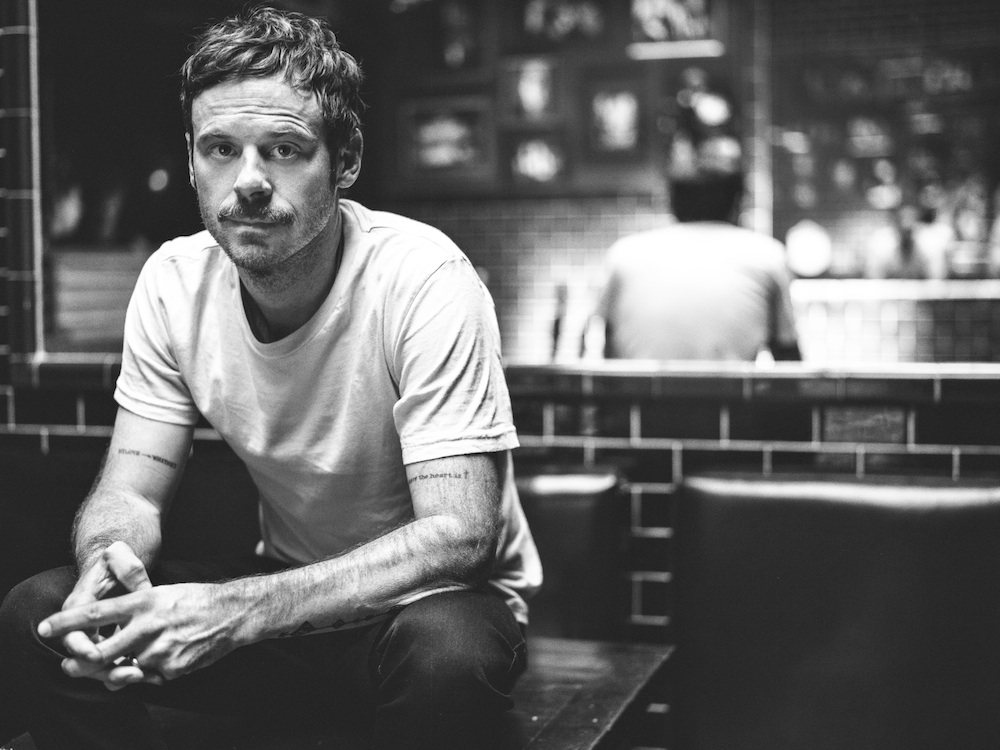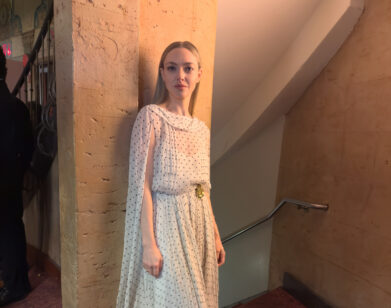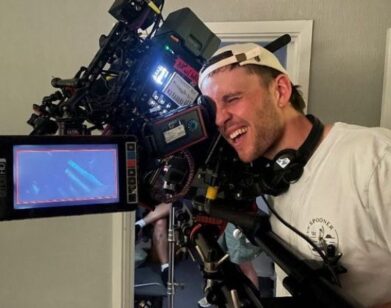Scoot McNairy

ABOVE: SCOOT MCNAIRY AT B BAR & GRILL IN NEW YORK, JULY 2014. PHOTO: CHRISTOPHER GABELLO. GROOMING: STEFANIE WILLMANN/SEE MANAGEMENT.
In college, Scoot McNairy owned a copy of Titanic on VHS: “Every night I would pop it in and go to sleep to the opening of it,” he recalls. Don’t mistake the actor for a sappy romantic, however; he rarely got to Jack and Rose’s meet-cute. “I couldn’t tell you what happens in the last two and a half hours of the film, but I can tell you line for line the first 30 minutes,” he laughs. “I just wanted to see everyone getting on the boat—cinematically, it was so awesome.”
Born and raised in Texas, McNairy has been acting professionally for over a decade, appearing everything from commercials (Nestlé, Levi’s, Mountain Dew) to sitcoms and the occasional cult film. He has eclectic taste in film; ask him what other movies he’s watched repeatedly and on the list are Wonder Boys (“I just loved that movie so much”), Heat (“I’ve seen it probably 300 times”), and The Rocketeer (“I watched it so many times and there’s not really a reason why”). The last movie that he remembers crying during is Life as a House. “I’ll be honest with you I went and saw that with four of my buddies and we all walked out with wet t-shirts. It got everybody.”
Glancing over McNairy’s résumé, it seems like 2012 was an obvious turning point in his career. Starting with Andrew Dominik‘s Killing Them Softly, McNairy was acting alongside the likes of Brad Pitt, Ben Affleck, Matt Damon, Michael Fassbender, and Leonardo DiCaprio. But McNairy doesn’t see it that way: “You always feel like there’s room to grow and there’s so much more that you want to do. That turning point would be retirement.”
He is, understandably, pretty happy with where his career is at the moment: he’s been in the Oscar’s Best Picture film for two consecutive years (Argo, 2012; 12 Years a Slave, 2013), and is looking for a hat-trick with David Fincher‘s Gone Girl, out this October. In May his film The Rover, director David Michôd‘s dystopian indie, premiered at Cannes (“I’m so proud and happy to be a part of that film,” he says. “It’s probably one of my favorite films”). Later this month, his Sundance hit Frank will come out in select theaters. Currently, he is filming the new Batman v Superman, but he can’t tell you anything about it yet.
This Sunday, the Season One finale of Halt and Catch Fire, McNairy’s first television series as a leading character, will air on AMC. Set in Texas in 1983 and focusing on the tech boom (“Silicon Prairie”), the show features McNairy as a brilliant, but unhappy and unsettled programmer named Gordon who teams up with a smooth-talking salesman (Lee Pace) and prickly college student (Mackenzie Davis) to build a new computer.
EMMA BROWN: Tell me about your first-ever audition.
SCOOT MCNAIRY: My first-ever audition was for a movie called Wrong Numbers (2001).
BROWN: You got the part.
MCNAIRY: I got it. I was taking an acting class down at the Dougherty Arts Center in Austin, Texas, and this guy came in and said, “I’m casting for my feature film on Saturday.” I was like, “I’m not going to be around on Saturday, can I read for you after class?” So I read for it there and then. He called me over to his apartment and I had to read the other scene off of his computer sitting next to him. We read it once or twice and he looked over to me and was like, “So do you want the part?” It was super low budget—actors, the director, and a cameraman and that was it. That was the first audition. There have been many wild ones since.
BROWN: Did you feel quite relaxed going into your second audition then: “This is going to be easy”?
MCNAIRY: It didn’t really feel like an audition to be honest with you. I didn’t really feel the grind or the pressure or the nerves from auditioning until I moved out to California. Then, you’re doing it so much, just every day. You eventually get to a point where you stop thinking about it. There are times where you’re like, “I really want this part.” And usually those are the ones you never get. I did commercials as well for 11 years, so I was auditioning two to three times a day, [and] every other day there would be a theatrical audition for a TV show or a movie. Those were the ones I was really focused on, but I was working so much [more] commercially because I was so much more relaxed and calm. I realized I needed to incorporate that into the theatrical [auditions]. It just takes a long time. The hardest part is just sticking with it. Bad news after bad news.
BROWN: Did you always want to be an actor?
MCNAIRY: No, I thought I was going to be an NFL football player. I was convinced: that’s clearly what I’m going to do. I’m going to be a linebacker. When I was in 7th grade and I only weighed like 95 lbs., I still believed that I would be an NFL football player. It wasn’t until I got a back injury and shattered a vertebrae playing football my sophomore year that I realized that I wasn’t going into the NFL, and it wasn’t until later that I realized that it was because of my size not because of my injury. I still kept telling myself the whole reason I didn’t get into the NFL was because I got hurt. I would have never made it into the NFL. So that’s what I wanted to do. Then, after that, I had a huge love for films and movies as a kid and a huge love for the outdoors, so I was either going to be a cameraman for the movies or wildlife park ranger. I went to film school to be a wildlife cinematographer and, being in California at that time, I started doing commercials.
BROWN: I never really thought about the cinematography until I started watching movies for work. Now it’s one of the first things I notice.
MCNAIRY: I had a love for photography, which of course rolled into cinematography, but me as well. What a frame can do, or a picture. Not all pictures but some pictures you’re like, “Wow, I wish I could be there” or you feel like you are there. I don’t know what it is about cinematography. I guess through my learning disability, through dyslexia, I’ve always been a visual learner—I take in everything through my eyes. Some of those guys out there, the NFL of cinematographers, I could never have competed with them. They’re just incredible.
BROWN: Is there anyone in particular that you admire?
MCNAIRY: [Roger] Deakins. I love Greig Fraser. Robert Yeoman—he does all of the Wes Anderson movies.
BROWN: Were you typecast when you were acting in commercials?
MCNAIRY: You were definitely in a category because when you’re in it for 10 years, you show up for a casting and you see the same 25 guys over and over. These 25 guys ended up becoming some of my really good buddies.
To book commercials, you do something to get to a callback, and once you get to the callback, you’ve got three minutes to get the people to want to hang out with you for a day. That’s it. Whatever you have to do in those three minutes to have them be like, “Hey, we like that kid” or “he’s funny” is how I got most of the work. That was my thing when I went in: change the script, add some stuff, make up some lines, and get these people to like you. Which is not the case theatrically.
That and you would lie so much. It was like, “Do you play golf?’ “Yeah, I play golf six times a week, absolutely.” Okay, he’s a golfer. “Can you skydive?” “Yeah, I used to be a skydive instructor.” This is perfect; he’s great for this. I’d say I could do anything just to get a job.
BROWN: Were you ever called out on it?
MCNAIRY: No. The only time I got called out was on a rock climb—[and] I am a rock climber. They wanted me to slack jump off of this thing in Utah, and I was like, “I’m not doing that.” But I never got the job, they just called me to confirm. In that Mountain Dew commercial I did, they were like, “Will you swim with sharks?” “If there’s a safety guy there.” I didn’t have to swim with sharks but…
BROWN: Did you have the same attitude in film auditions?
MCNAIRY: No, I make different choices in regards to the stories I want to be a part of. In my mind, it’s a totally different medium. Commercials are little skits, and movies are stories; I became a little more picky in my choices for stories that I wanted to be involved in.
BROWN: Earlier, we were talking about films that make you cry. 12 Years A Slave was a pretty rough one.
MCNAIRY: That movie really puts you in the world. Steve McQueen put you there on the plantation as a third eye. It wasn’t like you were watching a movie; it was like this is what it’s like to be here. It was such an amazing film. That’s a different kind of crying though, [your] chest gets tight and you feel like you want to do something or change the world or change your career path.
BROWN: Did it feel uncomfortable to feel in a moment?
MCNAIRY: No, that was one of those things that coach taught me: remember your feelings when you have them and check out for a second.
BROWN: What, in your opinion, makes someone a good actor?
MCNAIRY: Hard, hard, hard, hard work. A sense of nakedness—allowing yourself to be vulnerable, not even vulnerable, I hate that word, allowing yourself to be real. It’s weird that you have to work really, really hard just to be real or normal. Everybody’s got their different techniques, but what makes a really good actor is somebody who’s really believable. How you get there is different for everybody. I can watch anybody all day long if they’re really doing what they’re doing. I have a fascination with human behavior, watching people talk, when they pick at their face or how they hold their hand or if they’re listening to you, if they’re not listening to you. I think acting has made me very in tune with human behavior and myself as well: “Oh my god, I’m doing this and it’s clear that I’m interested or I’m trying not to act bored and I am bored.”
BROWN: How did you get there—to that sense of reality—for Halt and Catch Fire. What was your technique?
MCNAIRY: Mostly I spoke with a whole bunch of engineers. I knew that I wasn’t going to be able to learn how to build an actual computer in the time that was allotted for me to prep.
BROWN: But you thought about it?
MCNAIRY: Yeah. I’d mess with breadboards and soldering irons as a kid, playing around in the garage. But I was more interested in stories from around the office, what these people’s personalities were like. I looked at computer engineers as nerdy people, [but] once you start to talk to these guys…they weren’t meek, weak individuals, they would get in screaming fights. Stuff you never thought would take place over a computer. You think it’s just a bunch of nerdy guys sitting around and that wasn’t the case, there were some big, big egos involved and these guys that were really, really smart but didn’t know how to articulate that or verbalize that and that, within themselves, was really frustrating.
BROWN: Were they interested in talking to you?
MCNAIRY: Oh yeah. It was just us having some beers and chatting about the 1980s. They seemed actually really interested in it because nobody ever really cared to hear about these stories.
BROWN: Did you have a computer growing up?
MCNAIRY: No. I did not have a computer until recently. I’m not really a computer person; I’m really hands-on. I can’t make it work if it’s all behind the black curtain. It doesn’t interest me. I want to see what’s actually happening back there.
BROWN: Are you allowed to talk about Gone Girl?
MCNAIRY: Probably not too much. I read the book. I actually listened to the book on tape and they had a male person reading all the Nick stuff and then a female reading [Amy]. Creepy book. Scary. We’ll just see Fincher’s take on it. He’s an incredible director. He always makes things fascinating.
BROWN: Have you ever worked with a director who was very insistent about his or her authority? For obvious reasons, people generally only tell me about directors who have been particularly giving and collaborative—is that the norm?
MCNAIRY: Yeah, I think they’re generally collaborative. They hire you because they like your work [and] they expect you to come and do your work. I’ve had somebody whose been like, “Hey, I’m the boss here” and those movies usually don’t turn out that great. Sometimes they do, but when you hire somebody, you shouldn’t have to tell them [a lot of what] to do; you hire them because you like their work and all you’ve got to do is tweak them a little bit.
BROWN: What’s the first thing you want to know about a character you are going to play?
MCNAIRY: It’s so different for every one. Sometimes it’ll be a photograph—I like to look at the era. You reread the script and kind of hammer out some points, some emphasis, make sure you’re creating some arc for the character and the arc is clear. Then after that, you just start to think about it, and you think about it all the time. A month or two will go by and every single thing you do, you’re thinking about the character—when you’re in a store, you’ll buy something and realize you didn’t buy that, the character bought that. That part of it’s a little bit scary—”I’ve become this person and I didn’t even know it.” Then you get done with the job and all you want to do is get it off of you.
BROWN: How do you do that?
MCNAIRY: I usually shave, cut off all my hair, buy some different clothes—just something to feel like I’m not that person anymore. Going home to Texas really helps—everything is clearer, I’m calm.
BROWN: Has any one character been particularly difficult to shake?
MCNAIRY: Gordon from Halt and Catch Fire was not a tough one to shake but just a tough one to live with. My wife is was very patient when we were shooting. I’m very excited for Gordon to grow if we go another season. Maybe he’s in another place in his life.
THE SEASON FINALE OF HALT AND CATCH FIRE AIRS THIS SUNDAY, AUGUST 3, ON AMC. FRANK COMES OUT IN LIMITED RELEASE ON AUGUST 22. GONE GIRL COMES OUT ON OCTOBER 3.






